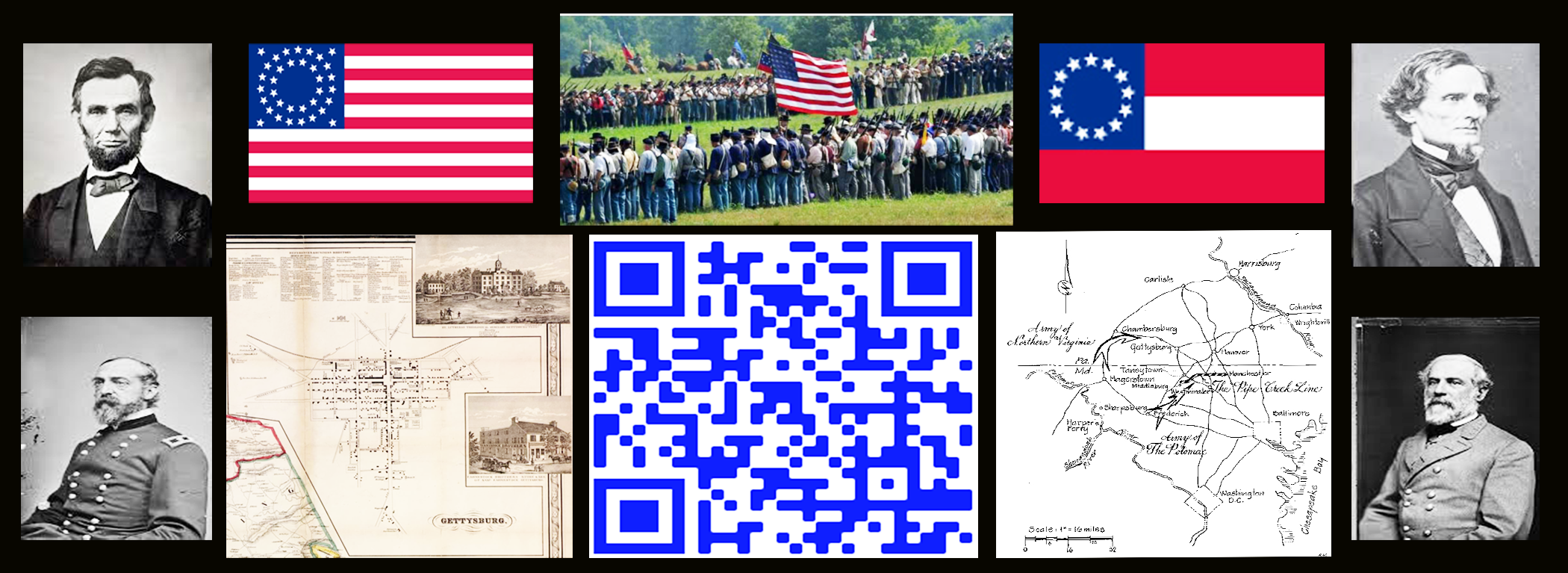In Section 28, I describe an elaborate scheme by which Lee could possibly have won the battle on Day 1. In Section 40, I ask why he was in such a hurry to ‘take the castle by brute force’. Herein, I suggest how Lee might have defeated the Army of Potomac (AoP) by encircling it to starve it. IOW, lay siege to the castle rather than storming it.
LTG Longstreet had been arguing against Lee’s tactics from the beginning. As a loyal officer, he reluctantly prepared for the ill-fated flank attack on Day 2. I tend to believe that he was hoping that Lee would come to his senses and call off that attack. LTG Sickles’ bold move thwarted Lee’s plan and detoured the attack to the east. Day 2 was an expansive disaster for both armies.
Longstreet had suggested that a shift south and an attack up the Taneytown Road would have a greater chance of success than Lee’s plan to attack via the Emmittsburg Road. ALT Hx scenarios suggest that this is not true, but Longstreet seemed to have the kernel of an idea that could have worked to Lee’s benefit.
It is still not clear to me WHY Lee was in such a hurry to attack that he resorted to the doomed frontal attack on Day 3. He never seems to have considered the option of laying siege as opposed to ‘storming the castle walls’. Seemingly, the arrival of Stuart’s cavalry on Day 2 added this option. I propose that Lee could have deployed the cavalry to the south with orders to interdict any supplies or re-enforcements headed for Gettysburg. To protect and bolster Stuart, he could have sent Pickett to the south end of Seminary Ridge and shifted Rodes to the south of Johnson in the east. Such moves would have encircled the Army of the Potomac [1].
I have frequently referred to the Army of Northern Virginia (ANV) as an island in hostile territory, but these simple moves could have completely reversed the polarity of the situation. Time was not on Meade’s side! In order to consolidate his army as quickly as possible, he had had them divest themselves of the majority of their supply wagons near Westminster. Within his ‘castle’ he had mainly medical and artillery / ammo wagons, but few other supplies. His men had been issued a few days’ worth of field rations. But he found himself with over 100,000 men and horses to fed; all crammed into a fairly small enclave. It would not be long before food, water and sanitation would become major issues.
I propose that Lee would have been much better served to declare a halt to the fighting on Day 3. By simply moving a few of his chess pieces on the board, he could have isolated Meade on to a ‘desert island’ of sorts.
Lee’s men, on the other hand, had all the food, shelter and supplies they needed –at least in the short term. As the ANV rested, the AoP’s situation would have been deteriorating by the hour. The torrential rains that began late on 3 July would have added to their misery. They had no tents to shelter them.
There seems to be no question that Meade would have had to consider a breakout to the south. His only chance at saving his army would be to reach the supplies at Westminster. It was only about 20miles away and so could be reached by a few hours of a forced march. But could he avoid being attacked en route and having his army chopped to pieces?
I’ll spare you readers the elaborate plans I devised to get the AoP to Pipe Creek. I will further speculate that Lee would have chosen to withdraw back to Virginia rather that pursue Meade. There was too great a threat that fresh troops might be waiting near Westminster such that he’d be walking into another ambush. He’d have known that he had badly hurt the ability of the AoP to wage war and that they’d need considerable time to refit. While it fell short of a full military victory, he was satisfied with what the northern invasion had accomplished. He had looted sufficient supplies for his army for months. Meade would likely resign in disgrace and the next commander would be more cautious and protective of his job.
Lee planned to be waiting for them when they next entered Virginia!
[1] They would have had the additional benefit of re-uniting the three divisions of his three corps.
